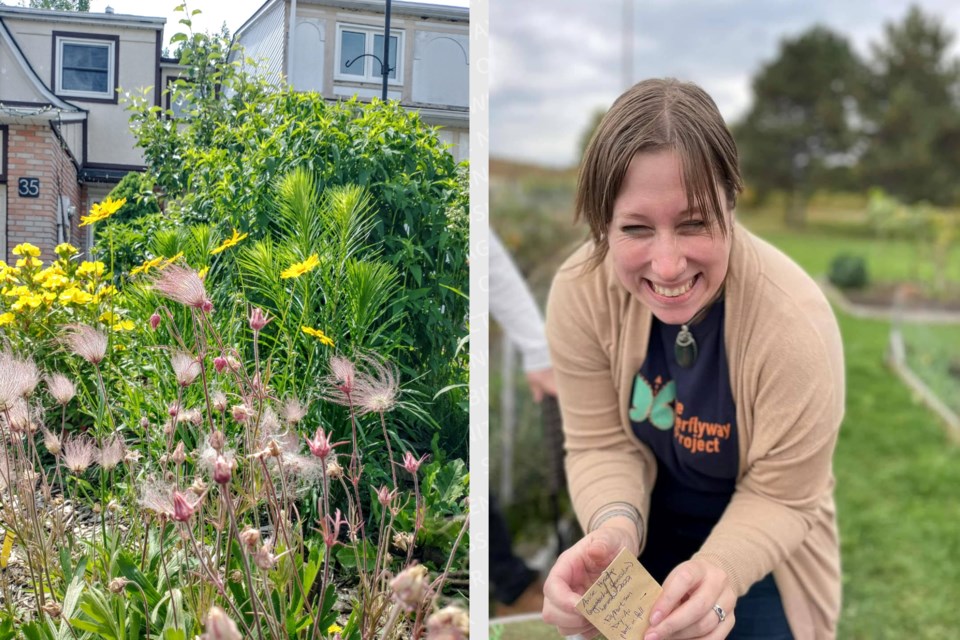Pollinate Barrie is hoping to create a lot of buzz around its new partnership with the Downtown Barrie BIA.
In an effort to nurture bees and other pollinators, the community-led, grassroots organization is set to work with the BIA and the MacLaren Art Centre to adopt four planters on Maple Avenue and plant them with native perennials that attract pollinators.
The group was founded by Ashley Hammell and Kelly Patterson McGrath in 2022 to educate, encourage, inspire, and support native ecosystem restoration within Barrie and the surrounding area.
Hammell says it all started after she and Patterson McGrath had begun to realize there were not very many places in the city using native plants to garden.
“It sounds a little bit finicky and nit-picky … (but) the monarch butterfly is endangered and we have the bee crisis and the climate crisis," Hammell told BarrieToday. "Our pollinators are in trouble.
"You hear about that in the news a lot, but the thing that keeps getting left out is that the biggest reason our pollinators are in trouble is because most insects are not generalist eaters, but are actually very specific about what they eat," she added. "They only eat the stuff they co-evolved with. That means the place where you and I live in Barrie. Plants that evolved here are the plants that these insects use to reproduce and do all of the pollination services, and perform the basic functions of being the foundation of the food web.”
Not planting these specific types of plants have basically “cut out our own legs from under us,” she said.
“We are paying money to put in expensive exotic plants that are not winter hardy and … need all of this coddling that our native plants don’t need," Hammell said. "We started asking why. Is it just that people don’t know that we should be planting these?”
Many people have never even seen plants that are native to the area, she noted. That has ultimately led to a large information and knowledge gap about why it’s important, what these types of plants even look like, and what the benefits are to even growing them.
Hammell says once the pair started talking about that, they also realized there existed a very real challenge of even finding native plants for sale in the area.
“Large-scale garden retailers don’t generally carry them, because it’s not legal to trademark a straight species plant," she said.
In an attempt to change that, Pollinate Barrie began planting public gardens in their own spaces to serve as seed banks.
“We planted them full of native, flowering species of grasses, shrubs and plants so that we could provide habitat in that way ... and share seeds with anybody who wanted them for free on an ongoing basis so (they) can have access to these native plants that are hard to go out and buy," Hammell said.
From there, Hammell said the pair began to educate residents and local businesses on how to grow and take care of them properly.
“Native plants have evolved to require a winter to break seed dormancy, so that means you actually need to do your gardening in the fall, not in the spring," she said.
They've now turned their focus to outreach and getting gardens planted, including creating partnerships with the Downtown Barrie BIA to create planters containing native species in various areas around the downtown.
“With the city making all of these declarations — this Bee City declaration, the Bird City and climate city declaration — but nothing was really being done, so (the BIA) wondered if it was worth taking spaces around the city, including public gardens, and turning them into pollinator oasis,” she said.
Hammell says she immediately jumped at the opportunity.
“Tiny little spaces really do make a big difference in this type of sphere, because some of our native bees only travel 500 metres in their entire lives," she said. "Little tiny pockets of land can make or break an entire population, so it is really worth it to make these small spaces more habitable for these little creatures.”
The BIA asked if the organization could help provide people the tools to understand why it’s important to be growing those particular plants, give them the tools to actually plant them and give them the tools to take care of them.
With Pollinator Week slated for June 19-25, Hammell said the plan is to turn some old planters on Maple Avenue from the forgotten pieces of concrete they are now into high density three-season, blooming plant gardens that shouldn’t need a lot of supplemental watering and can be expected to flower from the spring right through until the snow flies. They will also support several species of moths, butterflies and bees, as well as they will look good.
“We recognize there’s a big learning curve and this is a different way of approaching things like putting plants in the ground," she said. "Our gardening choices impact the native diversity around us in ways we aren’t necessarily paying attention to or aware of.
"Flowers do make things pretty, and that’s awesome, but if you choose the right flowers, you can help conservation and ecology.”



